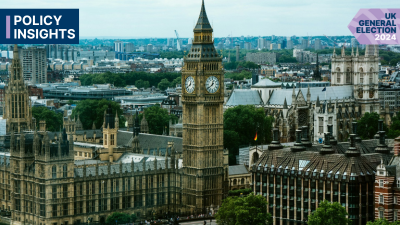A General Election reset for the Union?
Published: 1 July 2024
Policy Insights: Professor Nicola McEwen writes about the future of devolution and whether Labour's 'change' manifesto promises a new, more collaborative approach.

This blog is part of the Centre for Public Policy UK General Election Policy Insights series.
Author: Professor Nicola McEwen, Director of the Centre for Public Policy
Over the last eight years, Brexit, Covid and more complex devolution settlements have led to tensions and mistrust in relationships between the UK and devolved governments.
Whereas previous UK governments largely left devolved governments to manage their own affairs, Conservative governments since 2016 have been more willing to push back at the boundaries of devolution. This was seen in: referrals to the Supreme Court to challenge devolved competencies; bypassing devolved governments to spend directly in devolved areas; passing the United Kingdom Internal Market (UKIM) Act, to ensure devolution did not result in ‘unnecessary’ barriers to trade in the wake of Brexit; and ignoring the Sewel convention, which committed the UK Parliament to not normally legislate with regard to devolved matters without the consent of the devolved legislatures.
This more assertive approach to devolution adopted by the Conservatives in office was its way of strengthening and protecting the Union. From the perspective of the devolved governments, this approach undermined or further discredited the Union.
Does the Labour Party’s ‘change’ manifesto promise a new, more collaborative approach?
Certainly, there are fewer direct challenges to the authority of the devolved institutions, but the manifesto suggests more modest changes to constitutional policy.
Whereas the Labour Commission on the UK’s Future (led by Gordon Brown) had called for a new, broader and legally-binding formulation of the Sewel convention in law, including removing the ‘normally’ caveat to make it binding in all circumstances, the Labour manifesto falls some way short of that. It pledges a new memorandum of understanding ‘outlining how the nations will work together for the common good’.
For Wales, commitments to ‘explore’ the devolution of probation services and ‘consider’ the devolution of youth justice similarly fall some way short of the recommendations to devolve justice and policing made by both the Commission on Justice in Wales (the Thomas Commission) in 2019 and the Independent Commission on the Constitutional Future of Wales, which reported earlier this year.
No new devolved powers are offered to Scotland, but there is a pledge to increase Scottish representation in UK-wide bodies and facilitate international engagement in ‘wholly’ devolved policy domains ‘where relevant and appropriate’. Labour’s opposition to Scottish independence or to another referendum are restated, in stark contrast to commitments made elsewhere in the manifesto to self-determination for the Overseas Territories, Crown Dependencies, Palestine, and Northern Ireland.
With respect to Northern Ireland, the Labour manifesto commits to uphold ‘the letter and the spirit’ of the Good Friday Agreement and implement the Windsor Framework, negotiated by Rishi Sunak, to ease Brexit-related barriers to trade between Britain and Northern Ireland. Labour also commits to repealing and replacing the 2023 Legacy Act, which gives a conditional amnesty to those accused of killings during ‘the Troubles’ and was opposed by victims groups and all major parties in Northern Ireland.
The Brown Commission’s central constitutional recommendation was to replace the House of Lords with an Assembly of the Nations and Regions, with the responsibility for safeguarding the territorial constitution. The manifesto commits to removing the remaining hereditary peers and forcing life peers to retire at 80, but the more radical option offered by Brown is reduced to a consultation on ‘an alternative second chamber’ that is ‘more representative of the regions and nations’.
The manifesto takes up the recommendation of the Brown Commission to establish a new Council of the Nations and Regions, including leaders from the devolved governments and mayors of combined authorities. It’s not clear if this supplements or replaces existing ‘four nation’ intergovernmental machinery. Devolution within England remains very distinctive and is much weaker than the legislative devolution in the other UK nations. Putting leaders of the devolved nations alongside metro mayors risks further undermining their authority rather than restoring it.
By default, much of Labour’s manifesto is centred on England, as most of its ‘missions’ concern policy areas that are devolved to Scotland, Wales and Northern Ireland. Frequent references to resetting UK government-devolved government relationships lack detail.
A promise to restore ‘decision-making over the allocation of structural funds to the representatives of Scotland, Wales, and Northern Ireland’ makes little sense. Structural funds were provided by the European Union and administered by devolved governments. If this pledge refers to the UK Shared Prosperity Fund that partially replaced them, where does it leave other contentious programmes, such as Levelling Up or Community Renewal funding, where the UK government has bypassed the devolved governments to spend in devolved policy spheres?
Constitutional safeguards for devolution and intergovernmental relations are notable for their absence. A new approach to devolution and intergovernmental relations may yet transpire under a Labour government, but it will be one that rests on goodwill, a spirit of cooperation and investment in rebuilding trust.
Author
Nicola McEwen is Professor of Public Policy and Governance at the University of Glasgow (College of Social Sciences) and Director of the Centre for Public Policy.
Nicola has published widely in the field of territorial politics, nationalism, multi-level government and policy-making, and multi-level parties and elections. She is actively involved in informing debate within the wider policy and political community, through with extensive experience in providing analysis in broadcast, print and social media, public engagement, advice to governments and parliamentary committees, and consultancy.
Preview photo by Jamie Street on Unsplash
Tune in to our mini podcast series Spotlight: On the election.
We’re shining a light on the policy issues, the parties, key battlegrounds and events of the UK General Election, bringing you expert insights from the University of Glasgow and beyond.
Listen and subscribe on Spotify.

First published: 1 July 2024
Policy Insights
This blog is part of the Centre for Public Policy UK General Election Policy Insights series. The series shares research, knowledge and insights on the policy issues facing the country from key voices across the University of Glasgow and beyond.
Read more insights on our News and Insights page.
Mailing list
Sign up to the Centre for Public Policy mailing list to get the latest policy insights and our monthly newsletter straight to your inbox.

